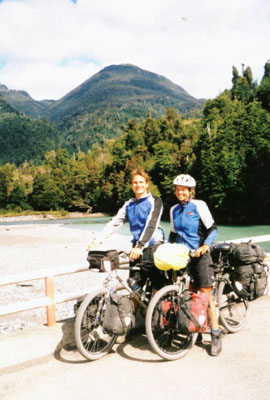China Cycling Travelogues
Do you have a China cycling travelogue you would like
to share here?
Contact us for details.

"Whiteleggs on Wheels Through China for Starfish"
Ros and Paul Whitelegg's story of cycling through China for Starfish Charity.
copyright Ros and Paul Whitelegg, 2003
Whiteleggs on Wheels - Update Three
18 May 2003, Litang, Sichuan Province, Peoples Republic of China
As we cruised down the pass, our teeth chattering with cold, it felt like
we were entering a different country. The land was dry pasture, grazed by
yaks, goats and wandering pigs. The first people we saw emerged from canvas
tents not the white tiled buildings we had grown accustomed to seeing over
the past two months. When we did reach the first village the houses were
also different than anything we had seen before. They were huge three or
four level buildings, made of mud, stones and tree trunks, with high compound
walls that were topped with grass. They had ornately carved wooden beams
and window frames painted in bright colours. We had arrived in the Tibetean
part of Yunnan province, and had we been cycling down this dirt road before
1959 we would have been entering a different country.
Although this part of China is a long way from the more densely populated
central and eastern parts of the country, unfortunately we have not escaped
the impact of the SARS virus or the Mao era methods of control the Chinese
authorities are now adopting to try and control it. Even with occasional
access to an internet linked computer, we have found it difficult to determine
the level of risk we have been exposing ourselves to by continuing to travel
in China. We have also been struggling to work out the logic and aim of
the governments response.
Having chosen to largely ignore the SARS crisis for the first month and
a half of our trip, it finally caught up with us in a town called
Lijang a few weeks ago. We arrived looking forward to spending some time
in this old city, one of the few places in China where historic buildings
have been preserved. This was not to be however, Lijang's hotels had been
told that they could no longer operate, the town was to be closed to visitors.
As in any such crisis there was considerable panic, there were stories going
around that neighbouring countries either already had, or were about to
close their borders with China. We witnessed a mad scramble of foreigners
to catch buses, trains and planes to get out of China while you still could.
We weren't going anywhere very fast on our bikes, so decided to stick it
out.
We found a back street guesthouse that was prepared to take us illegally
for the night and tried as best we could to blend in with the locals. This
was not very easy as you can no doubt imagine, so feeling like fugitives
and not wanting to put the guesthouse owner in any danger we left the next
day - what exactly was he risking for his 40 Yuan a night we wondered, a
fine, prison, maybe the firing squad?!
Since leaving Lijang we have either camped or found places to stay without
to much trouble. On one occasion however, the police moved us from one hotel
to another on the basis of helping prevent the spread of SARS. Quite how
moving from a double room in a clean, spacious hotel, to a grimy and crowded
dormitory, in the kind of establishment where a guest's miss-shot turd stays
lodged on the edge of the latrines for 48 hours, can help prevent SARS,
is perhaps something only Chinese officials can explain.
In addition to our own ignorance of the real SARS situation, we have also
encountered considerable ignorance of the source of the disease on the part
of many Chinese. We have witnessed much evidence to support the contention
that people are being told that SARS came to China from abroad and is being
spread throughout the country by foreigners. People cover their nose and
mouth as we pass. We have been refused food in restaurants and accommodation
in hotels, that remain open for Chinese people, even for Chinese tourists
from the SARS hotspots of Beijing and Guandong.
While this situation has the potential to turn nasty if the disease does rampage out of control, fortunately at the moment these attitudes are only outwardly demonstrated by a minority of the people we meet - for every mouth that gets covered we get dozens of smiles from other people and for every restaurant that refuses to serve us we get a multitude of other invites to sit, drink eat and chat (as best we can) with the people we pass.
We are writing this mail to you from a small town called Litang. After spending a week camping out in the wilds on our journey here, passing only small villages, the hectic concentration of people, motorbikes, market stalls and truck horns, was on first arrival rather overwhelming. This area had been described to us by concerned sources as "real bandit country" so the knives strapped to belts and the swaggering (sometimes drunken) walk of the cowboy hat wearing town folk kept us on edge. After a day or so however, we relaxed (helped by the best shower in 1400 km and a bottle of China's Great Wall red wine) and began to see the more endearing features of the place. Robed Buddhist monks both young and old wandered the streets, chatting to friends crouched on the floor cleaning ginseng roots to sell to local traders. The knife bearers turned out to also have huge smiles that revealed a plethora of gold teeth and would sit drinking tea looking almost as innocent as the old ladies that spent their days knitting and devoutly spinning prayer wheels.
Litang has an altitude of around 4000 meters above sea level, and to get here we crossed many mountain passes, three of which were over 4500 meters. Our route took us through remote countryside where we saw many colourful birds, our first real Chinese wildlife and had the opportunity to enjoy the nature in peace and tranquillity - very different than the first month and a half of our trip. When we did pass a village we would often stumble across people performing their prayers, walking round and round the white painted stupors, or find ladies sat outside their houses weaving wool into clothes for their families.
The high altitude scenery and this taste of Tibetan culture has both helped to prepare us and whet our appetite for the next challenge of the Tibetan plateau and the Himalayas. Due to SARS however, Tibet's normal fortress-like security and permit regulations have tightened even further. For the last 3 weeks no one apart from Tibetan residents have been permitted to travel to the province. While we are still several weeks away from where we hope to enter Tibet (Autonomous Region) if this situation does not change our planned route through Tibet, across the Himalayas into Nepal and on to India is in jeopardy. The monks here in Litang were today praying for an improvement in the SARS situation, lets hope Buddha was listening to them!
Ros and Paul
Whiteleggs on Wheels - Update One | Update Two | Update Three | Update Four
Starfish - Turning the Tide on AIDS
An old man had a habit of early morning walks on the beach. One day, as he looked along the shore, he saw a human figure moving like a dancer. As he came closer he saw that it was a young woman and she was not dancing but was reaching down to the sand, picking up starfish and very gently throwing them into the ocean.
"Young lady", he asked, "Why are you throwing starfish into the ocean?"
"The sun is up, and the tide is going out, and if I do not throw them in they will die."
"But young lady, do you not realise that there are miles and miles of beach and starfish all along it? You cannot possibly make a difference."
The young woman listened politely, paused and then bent down, picked up another starfish and threw it into the sea, past the breaking waves, saying:
"It made a difference for that one."
Adapted from the story "The Star Thrower" by Loren Eiseley
Starfish was formed in response to the unfolding tragedy of children orphaned or affected by the HIV/AIDS pandemic in South Africa. South Africa has the highest number of HIV positive people of any country in the world. By 2010, HIV/AIDS will kill as many as 7 million people, leaving 2.3 million orphans in its wake. (Source: UNAIDS)
Starfish was founded in London, England by a group of young South Africans and their friends in 2001. Motivated by our founding parable, Starfish believes that each of us can make a difference to the lives of the children of South Africa orphaned or affected by HIV/AIDS.
Bike China Adventures
Main Page | Guided Tours
| Photos | Bicycle Travelogues
| Products | Info |
Contact Us
Copyright © Bike China Adventures, 1998-2005. All rights reserved.
